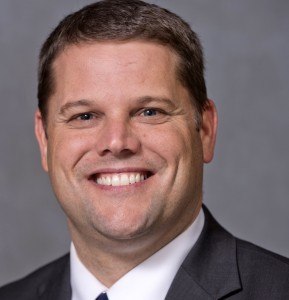Sen. Hester calls for cuts to colleges and AETN, selling War Memorial
by March 8, 2016 7:02 pm 903 views

Arkansas officials should “rein in” spending on higher education, spend money on libraries instead of the Arkansas Educational Television Network, and sell War Memorial Stadium, a state senator said Tuesday (March 2).
Legislators will make funding decisions in a fiscal session, which occurs every even-numbered year, beginning April 13. Sen. Bart Hester, R-Cave Springs, wrote in a press release that the submission of the governor’s $5.3 billion budget, which was recommended to the legislative Joint Budget Committee Tuesday, makes this a good time to consider cuts in those areas so taxes can be lowered and savings put in a rainy day fund.
Hester is chair of the Joint Budget Committee’s Personnel Subcommittee, and chairs the Counties and Municipalities Subcommittee of the Legislative Joint Auditing Committee. He also chairs the Senate’s Economic and Tax Policy Committee. He also has been state chairman of U.S. Sen. Marco Rubio’s presidential campaign in Arkansas.
Hester wrote that spending in certain large categories, including Medicaid and K-12 education, can’t be changed “because of popular opinion, court rulings or federal mandates.” However, Hester wrote that spending at Arkansas institutions of higher education is “out of control,” as those institutions annually hire administrators and construct buildings while raising tuition and fees. Students are incurring more debt for college loans, but college degrees are not becoming more valuable at the same rate.
“The legislature must rein in spending on higher education until the institutions show a commitment to their students, a commitment that they appreciate the meaning and value of what they offer,” he wrote.

Funding for the state’s individual institutions of higher education is flat in Hutchinson’s budget for 2016. Also not changed was $40 million in Department of Higher Education grants that Hester contrasted with a lack of resources provided for foster children and a lack of social workers for vulnerable children.
Of that, $20 million is for Academic Challenge Scholarships, and much of the rest is for students obtaining education in a health field where the degree is not offered in Arkansas, said Dr. Brett Powell, director of the Arkansas Department of Higher Education.
Powell said colleges and universities are trying to increase efficiency and said funding for the state’s four-year schools is based on a formula that, consistent with national and regional norms, should result in $743 million in state funding per year. Instead, he said total state funding to those schools is about $440 million, and it hasn’t changed in five years. To make up the difference, colleges and universities must raise tuition, which composes about half of their funds, while cutting services that would help students graduate.
Powell referenced a 2015 study by the Georgetown University Center on Education and the Workforce that said the economy since 2010 had created 2.9 million “good jobs” that offer at least $53,000 in earnings and provide health insurance and retirement plans, and 2.8 million of them went to college graduates with at least a four-year degree.
Hester said the state is spending $849,500 managing War Memorial Stadium in Little Rock, which he said should be sold, with the property taxes collected by Pulaski County to help fund the Little Rock School District.
Hester also criticized the state for spending $5.3 million on the Arkansas Educational Television Network last year while cutting support for local libraries by 18%, which he said was “not a wise trade-off, especially at a time when the free market offers such an ample array of choices in telecommunication.”
Allen Weatherly, AETN’s executive director, said state funds pay for operations, infrastructure and locally produced programming, while purchased programming is funded by donations through the AETN Foundation or grants through the Corporation for Public Broadcasting.
“Most of the so-called alternatives to AETN/PBS – such as A&E, Bravo, The Learning Channel, Nickelodeon, even much of The History Channel – have moved away from the type of programming provided by AETN because they have found them not to be profitable enough for commercial purposes,” he wrote.
